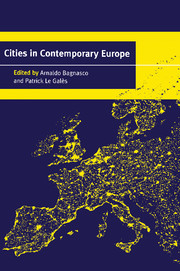Book contents
- Frontmatter
- Contents
- List of figures
- List of tables
- List of contributors
- Preface
- Introduction: European cities: local societies and collective actors?
- 1 European cities in the world economy
- 2 Spatial images of European urbanisation
- 3 Segregation, class and politics in large cities
- 4 Social structures in medium-sized cities compared
- 5 Different cities in different welfare states
- 6 Social movements in European cities: transitions from the 1970s to the 1990s
- 7 The construction of urban services models
- 8 Private-sector interests and urban governance
- References
- Index
1 - European cities in the world economy
Published online by Cambridge University Press: 12 October 2009
- Frontmatter
- Contents
- List of figures
- List of tables
- List of contributors
- Preface
- Introduction: European cities: local societies and collective actors?
- 1 European cities in the world economy
- 2 Spatial images of European urbanisation
- 3 Segregation, class and politics in large cities
- 4 Social structures in medium-sized cities compared
- 5 Different cities in different welfare states
- 6 Social movements in European cities: transitions from the 1970s to the 1990s
- 7 The construction of urban services models
- 8 Private-sector interests and urban governance
- References
- Index
Summary
Cities in the economy, between the rise of the global and the return of the local
In the early days of political economy, from Richard Cantillon to Adam Smith, the city, the interaction of cities and the relation between city and country were active categories of economic analysis. Then, with the exception of the occasional unorthodox approach – that of Jane Jacobs, for instance – the categories became somehow passive and were covered by the homogenising film of the ‘national’ or ‘international’ economy. However, the predominance of national scales for economic performance – backed up by the fact that today national perimeters are far and away the best served by statistics – calls for reflection. The increasing interdependence of so-called ‘national’ economies is in fact accompanied by persistent, frequently increasing, regional – i.e. infranational – disparities. The most significant cases of development are not so much national as limited to particular, sometimes restricted, zones which are invariably under the control of large cities (Chinese growth provides an excellent example).
In Europe, as elsewhere in the world, one can see the accelerated concentration of production and consumption in metropolitan urban areas, both within the orbit of an outsize city – the Paris or London regions – and of a more dispersed kind, as in northern Italy and the Rhineland. The extreme polarisation of ‘global’ financial activity and of high-tech research within a few world centres, the dynamism of the new city-states relieved of the costly problems of a hinterland – Singapore or Dubai – are merely extreme forms of a process which at different degrees concerns all developed economies.
- Type
- Chapter
- Information
- Cities in Contemporary Europe , pp. 33 - 47Publisher: Cambridge University PressPrint publication year: 2000
- 11
- Cited by



